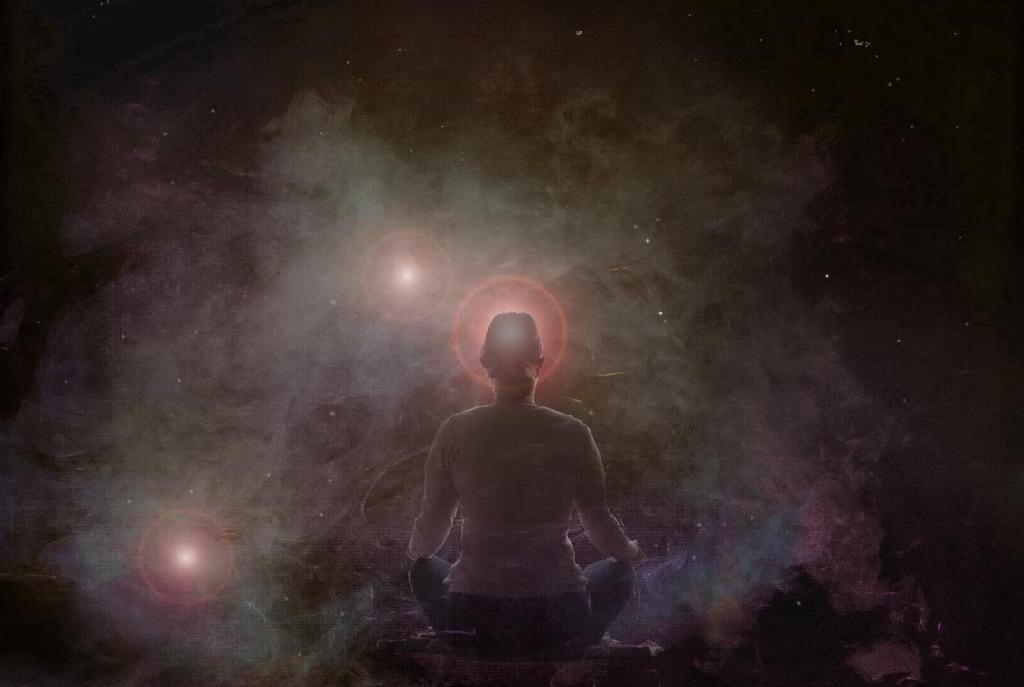The green waters of the reservoir are like glass. On the surrounding ridges, motionless pines tower over the man-made lake and reflect off the surface of the water with mirror-like sharpness.
 There isn’t a trace of a breeze. It’s so quiet that crunching almonds in one’s teeth seems loud. The place is an echo chamber for the cosmos. Listening inclusively and attending completely to outward and inward movement, the mind-as-thought falls silent, and the sacred is.
There isn’t a trace of a breeze. It’s so quiet that crunching almonds in one’s teeth seems loud. The place is an echo chamber for the cosmos. Listening inclusively and attending completely to outward and inward movement, the mind-as-thought falls silent, and the sacred is.
All sound occurs in silence, but we rarely ‘hear’ the silence because the noise of man and thought is so loud. Man is thought, and perception and reception of the sacred call for a very still, empty mind.
One realizes, during moments of awareness of otherness, that it is complete in itself. Yet we are finite creatures, the products of cosmic and planetary evolution. Does the sacred require a conscious brain with a very quiet mind? Does evolution move, without specific goal, in that direction?
Hard core atheists deny the existence of the numinous, and thereby deny the possibility of experiencing something beyond the mind and brain. Believers, on the other hand, assert certainty about God, and thereby deny the possibility of experiencing something beyond the mind and brain.
The correct approach is holding open the question of the numinous, even and especially if one has experienced it many times. That is the only way of experiencing it anew in the present.
Does the benediction require the fully aware and quiet brain of a sentient being? Is that the meaning and purpose of life in the universe?
If we define sentience as awareness of awareness, then humans are probably the only sentient beings on this planet. Yet humans are also destroying the planet. And the inward potential of the human being is being lost in direct proportion to the decimation of diversity of life on earth.
Science, when it becomes scientism, also denies the potential of the brain to enter in the vastness of mind-beyond-thought. Scientism is the belief that the rational capacities of the human mind, applied with the rigorous methodology for the purpose of the advancement of knowledge, is the highest good.
Reductionism is the right principle for science, but not for life and living. Beyond a point, life cannot be reduced to its constituent parts because life is not formed out of constituent parts, no matter how obsessed science is on finding sub-atomic particles.
The notion that life can be reduced to its ‘basic building blocks’ is the fundamental confusion of many scientists. They project the basic premise of thought—separateness—onto the universe, which unfolds in wholeness.
Neuroscientists proudly assert “our generation of scientists are translating abstract philosophical questions about mind into the empirical language of biology.” This is precisely the language of scientism, of science overstepping its bounds. It exemplifies how science is arrogating the perennial questions of philosophy and religion.
about mind into the empirical language of biology.” This is precisely the language of scientism, of science overstepping its bounds. It exemplifies how science is arrogating the perennial questions of philosophy and religion.
Some questions can never be answered, and must simply be held in the mind. Other questions can be tentatively answered but have to be perennially asked anew. The questions above are of both types.
But science is in the business of answering questions, not holding and leaving open questions, with no intent to answer them. There is a point where science must leave off, allowing space for philosophical and spiritual questioning.
Without duality, can we make a distinction between mind-as-thought, and mind-without- thought? Is there duality when the mind-as-thought is negated in attention, and the mind-without-thought is not definitively posited?
If the mind is simply a set of operations carried out by the brain, then it rules out any possibility mind beyond thought. Accepting that definition of mind and brain limits the capacity of the brain; it also denies another meaning altogether of mind. Statements like that make science into a belief system, without allowing any other possibility, that of awareness of otherness.
The meditative state is a radically quiet mind, a mind not engaged in thinking and thought of any kind—not words, images, memories, associations, or knowledge. Therefore the mind in meditation is qualitatively different than the mind-as-thought, which is what we normally know.
The operating system that runs the machinery of thought in the brain is the observer, thinker and self. It lies at the root of man’s infinite regression of separation and division.
Therefore the first thing to question and observe is the observer itself. The supposedly separate observer and permanent self are a fiction, a trick the brain devised to process, organize, and control information stored in memory.
By passively watching the operation of the mind, the mechanism of the separate observer effortlessly ends. That is the beginning of meditation. There is no science without the observer, which is why very few scientists awaken meditative states. Can that change? Can meditation, rather than being a subject of scientific study, open a completely different dimension of being?
When awareness grows quicker than thought and the ancient habit of separation spontaneously ends, attention grows and sweeps away the useless, unnecessary content of consciousness. One observes the flow of thoughts and emotions directly, as they arise, and in doing so, the mind falls silent and the heart grows peaceful.
At that point, if one is fortunate, the completely quiet mind comes into contact with something that can only be called sacred. About it, nothing more can be said.
Martin LeFevre

